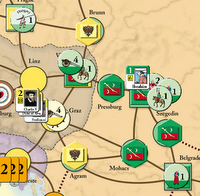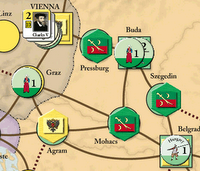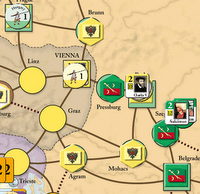218BC
Rome draws a campaign card and, lacking anything truly better to do with it,uses it to start the turn and place PCs in Dertosa, Tarraco, and Illerda, to force Carthage to spend some time cleaning up her backyard before heading to Italy. As it turns out, that's not the ideal spaces for this initial placement, since Carthage is able to immediately block off further PC play from Rome with PCS of her own in Azaila and Iberus, plus one in Taurini for good measure.
 Rome follows that up with PC placement in Verona and Mutina, to challenge Carthage in Gallia Cisalpinia, though probably at a later date. meanwhile, there are rumblings from Spain that Hannibal is on the move with his army, dropping 1CU in Dertosa to convert that space and proceeding with the bulk of his army to Narbo in Massilia. Unfortunately, on the way an Epidemic hits his army, costing him 2CU while he rests in Narbo.
Rome follows that up with PC placement in Verona and Mutina, to challenge Carthage in Gallia Cisalpinia, though probably at a later date. meanwhile, there are rumblings from Spain that Hannibal is on the move with his army, dropping 1CU in Dertosa to convert that space and proceeding with the bulk of his army to Narbo in Massilia. Unfortunately, on the way an Epidemic hits his army, costing him 2CU while he rests in Narbo.Carthage secures Idubeda by placing a PC in Bilibis and flipping the PC in Dertosa. Rome, meanwhile, build up her army in Rome with 2CU of auxiliaries from Etruria. And Carthage use Diplomacy to flip the Roman PC in Ilerda, leaving Rome with just a single space in Idubeda (Tarraco) to show for their first card play.
Anticipating Hannibal's arrival and a few military setbacks, Rome places a PC at Rhone in Gallia Cisalpinia. And they don't have long to wait for carthage's Campaign. While Mago consolidates the forces in Spain into New Carthage, Hannibal marches across the Alps, losing 2CU on the way, and straight through to Mutina.
The news of Hannibal's arrival causes a panic and an upsurge in military recruiting, with 2CU of auxiliaries arriving from Samnium to bolster Rome's armies. Meanwhile, Gallic Recruits join Hannibal, offsetting his 2CU attrition losses in the Alps.
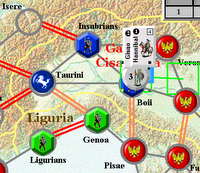 As 218BC draws to a close, Hannibal suffers 1CU attrition while wintering in the hostile environs of Mutina.
As 218BC draws to a close, Hannibal suffers 1CU attrition while wintering in the hostile environs of Mutina.The Province count is even (* = not counted):
- Carthaginia (C)
- Carthage (C)
- Eastern Numidia (C)
- Western Numidia (C)
- Baetica (C)
- Orospeda (C)
- Celtiberia (C)
- Idubeda (C)
- Gallia Cisalpinia (C)
- Etruria (R)
- Samnium (R)
- Latium (R)
- Campania (R)
- Apulia (R)
- Lucania (R)
- Syracuse (R)
- Sicilia (R)
- Corsica Sardinia (R)
- * Balearic Islands (C)
- * Gallia Transalpinia (N)
- * Massilia (N)
- * Liguria (N)
217BC
Carthage places 1CU in Carthage (now 5), 2CU in New Carthage (now 5), and 1CU with Hannibal in Mutina (now 5 +2 elephants). Rome Places all 5CU in Rome (now 15CU). Longus will remain as proconsul, since I want his 2 rating to improve my chances of being able to move him into Italy where he will soon be needed. If I get rid of him, I may get unlucky and get a 3 leader there and no 3 cards with which to move him. The consuls for 218 are Fabius and Marcellus, both placed in Rome. At least I will have good generals with which to face Hannibal this turn.
Rome starts the year by placing PCs in Druentia and Narbo, in anticipation of losing battles to Carthage and recalling Longus from Sicily to the mainland with his Army, making it as far as Rhegium. Hannibal, meanwhile, reinforces his army with a host of Ligurians and secures control of Mutina and Numantia before moving forward. he leaves a garrison at Firmum Picenum to secure control and puts his main army in Numantia.
Longus marches his army by force to Numantia to take on Hannibal. The battle teeters on the brink for a long time, but in the end, Hannibal has just enough resources available to pull out a victory. Hannibal loses 2 units from his Army, while Rome loses 3 during the battle and 2 more on the retreat to Beneventum. When news of the loss becomes known, Rhone and Druentia drop their allegiance to Rome. After theb attle, Hannibal secures his current position, flipping PCs in Ariminum and Firmum Picenum.
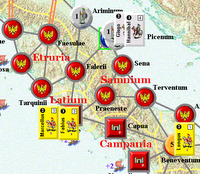 Looking to inflict yet more losses on Hannibal's army, Fabius leads his Army from Rome to attack. In this case, however, Hannibal has chosen his ground extremely well and Fabius is keenly aware that he is at a great disadvantage. When Hannibal sends out a Probe, Fabius takes the opportunity to retreat from battle. Neither side suffers any battle losses, though Fabius loses 2CU retreating back to Rome. Narbo throws off Rome's influence as a result, though Rome quickly send envoys to restore order in the city.
Looking to inflict yet more losses on Hannibal's army, Fabius leads his Army from Rome to attack. In this case, however, Hannibal has chosen his ground extremely well and Fabius is keenly aware that he is at a great disadvantage. When Hannibal sends out a Probe, Fabius takes the opportunity to retreat from battle. Neither side suffers any battle losses, though Fabius loses 2CU retreating back to Rome. Narbo throws off Rome's influence as a result, though Rome quickly send envoys to restore order in the city.The people of Lilybaeum, meanwhile, revolt against Roman rule, and a small force of Carthaginian sympathizers takes over the city. Marcellus leads a small consular Army back to Sicily, where he deals roughly with the traitors. But, as 217 draws to a close, the people of Sardinia and Corsica revolt against Rome also, and all Roman influence is removed from the islands.
Marcellus, wintering among the unfriendly populace of Lilybaeum suffers 1CU attrition losses. And the isolated pocket of Roman sympathizers in Verona are also removed. As a result of the growing popularity of Hannibal, Narbo ping-pongs back out of Roman control.
The Province count is: 9 for Carthage; 8 for Rome (* = not counted):
- Carthaginia (C)
- Carthage (C)
- Eastern Numidia (C)
- Western Numidia (C)
- Baetica (C)
- Orospeda (C)
- Celtiberia (C)
- Idubeda (C)
- Gallia Cisalpinia (C)
- Etruria (R)
- Samnium (R)
- Latium (R)
- Campania (R)
- Apulia (R)
- Lucania (R)
- Syracuse (R)
- Sicilia (R)
- Corsica Sardinia (N)
- * Balearic Islands (C)
- * Gallia Transalpinia (N)
- * Massilia (N)
- * Liguria (N)
216BC
Marcellus loses 1CU Wintering in theh ostile environs of Lilybaeum. he is, however, retained as Proconsul while P. Scipio and Nero are elected Consuls.
The years starts with a battle for control of Sardinia. Rome places PCs in Lilybaeum and Carales. Carthage responds with PCs in Oristano, Sassari and Nuoro. Rome closes the space off with PCs in Aleria and Narbo. As things stand right now, Carthage controls the province.
Hannibal moves his force to Sena where he drops a CU, then back to Falerii, where P. Scipio intercepts him. Hannibal has an off day, missing 2 attempts to counter-attack after Roman Probes, and in the end is forced to withdraw, losing 2CU and an elephant.
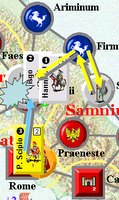 Nero attempt to capitalize by moving up from Benevenutum to attack while Hannibal is off balance, but Bad Weather forces him to stop in Rome.
Nero attempt to capitalize by moving up from Benevenutum to attack while Hannibal is off balance, but Bad Weather forces him to stop in Rome.Despite the setback, Hannibal Charms Italy and puts his army into motion again. He removes the Roman PC in Sena, gathers up his far-flung garrison forces, and ends in Ariminum.
Marcellus, meanwhile, boards Galleys and sets sair for Sardinia to restore Roman control, landing in Sassari.
Hannibal places a PC in Sena, while Marcellus flips the PC in Sassari and Rome regains control of Sardinia but loses control of Samnium.
The year ends with a whimper as Carthage places PCs in Verona, Salmantica, and Numantia. Rome places a PC in Druentia and adds 2CU of Allied Auxiliaries (Lucania) in Rome.
The Province count is: 9 for Carthage; 8 for Rome (* = not counted):
- Carthaginia (C)
- Carthage (C)
- Eastern Numidia (C)
- Western Numidia (C)
- Baetica (C)
- Orospeda (C)
- Celtiberia (C)
- Idubeda (C)
- Gallia Cisalpinia (C)
- Etruria (R)
- Samnium (C)
- Latium (R)
- Campania (R)
- Apulia (R)
- Lucania (R)
- Syracuse (R)
- Sicilia (R)
- Corsica Sardinia (R)
- * Balearic Islands (C)
- * Gallia Transalpinia (N)
- * Massilia (N)
- * Liguria (N)
215-214 BC
Carthage places 1CU in Carthage (now 7), 2 in New Carthage (now 9), and 1 with Hannibal in Ariminum (now 5 plus 1 elephant). Rome places 1 in Falerii (10), 3 in Rome (10), and 1 in Sassari (7). Marcellus remains the proconsul in Sassari. The consul Nero is placed in Rome and Consul Fabius in Falerii.
Carthage allows Rome to go first, and Marcellus moves to Oristano in Sardinia, to continue he reconquest of that island. Carthage places 2Cu worth of Iberian Recruits in New Carthage (11). Rome flips the PC in Oristano and places PCs in Nice and Nemausus. Carthage reinforces Hannibal with 1CU (6CU plus 1 elephant).
Carthage has a Messenger Intercepted, and is forced to give a card to Rome. An Epidemic breaks out in Rome, and Nero loses 3CU from his forces. They are quickly replaced by 2CU of Allied Auxiliaries from Campania who have heard great things about the available disease at Roman camps.
While Rome is thus occupied, Carthage unleashes a Major Campaign. Mago and 7 CUs ifromNew Carthage attenpt to sail to Lilybaeum, but they encounter disaster along the way and the entire force is lost at sea. With the landing force at the bottom of the Mediterranean Sea, Carthage calls of further campaign activities.
Rome, having survived a near-miss, continues to make preparations for offensive action of her own, placing a PC in Rhone. A Truce is declared as Carthage seeks time to rebuild her Army. But Rome's preparations for a Major Offensive are too far along, and the Truce is broken almost as soon as it has started.
Fabius+10 attack Hannibal in Ariminum, with 15 cards to his 12. A Spy in Enemy Camp carries off some details of Rome's battle plans to Hannibal, which he uses to cause a long stalemate on the battlefield and eventually withdraw in good order to Mutina after having lost just 1CU and a PC in Salmantica. The offensive continues with Marcellus+7 returning to Rome, freeing up Nero+9 to move to Firmum.
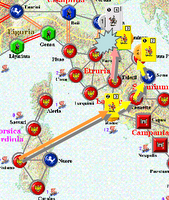 Carthage use their last card to place PCs in Araceli and Salmantica, leaving Rome with 3 cards to play.
Carthage use their last card to place PCs in Araceli and Salmantica, leaving Rome with 3 cards to play.PCs in Firmum and Arminium are flipped, returning Samnium to Roman control.
Marcellus+7 moves to Firmum, pick up 3CU, and then attack Hannibal in Mutina. It's a disaster for Carthage. Hannibal attempts to withdraw after just one round, and is thwarted. He loses the battle in the next round on a Double Envelopment. His entire force is wiped out in retreat. Hannibal is captured and quickly disposed of by the vidictive Romans. As news of the disaster spreads, Sena, Araceli, Numantia, Segovia, Salmantica, Vescera, and Thamugadi all lose faith in Carthage.
 Rome ends this most fortunate of turns by flipping the PC in Mutina and adding a PC in Sena.
Rome ends this most fortunate of turns by flipping the PC in Mutina and adding a PC in Sena.The Province count is: 9 for Carthage; 9 for Rome (* = not counted):
- Carthaginia (C)
- Carthage (C)
- Eastern Numidia (C)
- Western Numidia (C)
- Baetica (C)
- Orospeda (C)
- Celtiberia (C)
- Idubeda (C)
- Gallia Cisalpinia (C)
- Etruria (R)
- Samnium (R)
- Latium (R)
- Campania (R)
- Apulia (R)
- Lucania (R)
- Syracuse (R)
- Sicilia (R)
- Corsica Sardinia (R)
- * Balearic Islands (C)
- * Gallia Transalpinia (N)
- * Massilia (N)
- * Liguria (N)
213-212 BC
Carthage places 1 CU in Carthage (8CU) and 3 CUs in New Carthage (7CU). Mago returns to action in Carthage while Gisgo goes to New Carthage. Rome places 4CU in Firmum (10CU) and 1CU in Arminum (10CU). Marcellus remains as proconsul, while Longus in Arminum and Nero in Firmum take over as consuls.
Both of us had very bad hands this turn which led to a fairly uneventful turn.
Iberian Recruits flock to Carthage's aid, bringing his army in New Carthage to 9CU. Nero takes an Army of 10CU to Lilybaeum to protect Sicily, but Storms At Sea turn the trip into a hellish experience and only 6CU remain when he debarks.
A series of PC placements follows. Carthage places PCs in Thamugadi, Segovia, Salmantica, Numantia, Araceli, and Vescera while Rome places a PC in Druentia, moves Longus to Verona and flips a PC there, and uses Diplomacy to flip the PC in Taurini, taking control of Gallia Cisalpinia.
Carthage further builds his forces in Carthage (to 9CU) while Hanno Counsels Carthage that forces should not leave Africa. Then Numidia Revolts, removing all PCs in Western Numidia.
And, to end the turn, Nero takes 10CU to Tarraco in Hispania awaiting the arrival of Scipio Africanus.
The Province count is: 7 for Carthage; 10 for Rome (* = not counted):
- Carthaginia (C)
- Carthage (C)
- Eastern Numidia (C)
- Western Numidia (N)
- Baetica (C)
- Orospeda (C)
- Celtiberia (C)
- Idubeda (C)
- Gallia Cisalpinia (R)
- Etruria (R)
- Samnium (R)
- Latium (R)
- Campania (R)
- Apulia (R)
- Lucania (R)
- Syracuse (R)
- Sicilia (R)
- Corsica Sardinia (R)
- * Balearic Islands (C)
- * Gallia Transalpinia (N)
- * Massilia (N)
- * Liguria (N)
211-210 BC
Carthage places 2 in Carthage (11) and 2 in New Carthage (11). Rome places 5 CUs in Rome (5) and places Scipio+5CU in Tarraco in Hispania (15). Marcellus remains Proconsul in Mutina, Varro goes to to Verona (10), Longus to Rome.
Rome leads the turn off, playing a campaign card to place PCs in Western Numidia: Icosium, Saldae, Tupusuctu. Carthage later places PCs in the remaining spaces, Zuccabar and Vescera.
A Carthaginian Naval Victory makes naval movement difficult this turn for Rome.
Scipio begins campaigning in Hispania, dropping 1CU in Carthaginian-controlled Illerda while moving the bulk of the army to the Dertosa. He then consolidates his position, converting both Illerda and Dertosa.
Carthage tries to shore up its position in Hispania, placing a PC in Salmantica.
Varro leads his 10CU from Verona back to Rome.
Hasdrubal takes 10 CUs up the coast and attacks Scipio at Dertosa. The see-saw battle rages for hours, but in the end hadrusbal is forced to flee the field. Both sides leave 2CU on the field, while Hadrusbal loses 4Cu in retreat to the safety of Saguntum.
Scipio follows up his victory with a further movement into Hispania. He takes 9CU to Illerda where he picks up the lonely garrison, only to drop it off in Iberus, and another in Azalia before he reutrns himself to Dertosa.
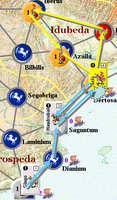 Corsica and Sardinia Revolt, removing all Roman PCs from Corsica and Sardinia, for the second time. Rome responds with PCs in Oristano and Sassari. Carthage follows up with PCs in Aleria, Nuoro and Carales, taking control. Thwarted, Rome takes revenge in Hispania, converting Iberus and Azalia.
Corsica and Sardinia Revolt, removing all Roman PCs from Corsica and Sardinia, for the second time. Rome responds with PCs in Oristano and Sassari. Carthage follows up with PCs in Aleria, Nuoro and Carales, taking control. Thwarted, Rome takes revenge in Hispania, converting Iberus and Azalia.Hanno takes 3 CUs and moves cross country to Saldae in Western Numidia, in the hope of retaking that province for Carthage. Unfortunately, a Numidian Ally allows Roman to place PCs in Sitifis, Thamagudi and Cirta. So even though Carthage is able to convert Saldae, the rest of Western Numidia is cut off and isolated PCs are removed from Vescera and Zuccabar.
The Province count is: 6 for Carthage; 11 for Rome (* = not counted):
- Carthaginia (C)
- Carthage (C)
- Eastern Numidia (R)
- Western Numidia (R)
- Baetica (C)
- Orospeda (C)
- Celtiberia (C)
- Idubeda (R)
- Gallia Cisalpinia (R)
- Etruria (R)
- Samnium (R)
- Latium (R)
- Campania (R)
- Apulia (R)
- Lucania (R)
- Syracuse (R)
- Sicilia (R)
- Corsica Sardinia (C)
- * Balearic Islands (C)
- * Gallia Transalpinia (N)
- * Massilia (N)
- * Liguria (N)
209-207 BC
Carthage places 1CU in Carthage (now 9), 1CU in Saguntum (now 5), and 2CU in New Carthage (now 3). Rome places 1CU in Mutina (10), 2CU in Rome (17), and 2CU in Dertosa (13). Varro and Longus both return as consuls, in Rome. Marcellus and Scipio are Proconsuls.
209BC start when Sophonsiba Seduces a Numidian Kin, placing a Carthage PC in Thevestis, and flipping PCs in Cirta and Sitifis.
Scipio then sets his Army into motion in Hispania. Scipio takes 9CU to Azaila, where he picks up 1CU, goes through Bilibis to Segovia, where he drops a CU, and then settles in at Segobriga. Hadrusbal intercepts him there. Once again, Scipio and Hadrusbal fight a long see-saw battle which this time ends with the encirclement and elimination of Hadrusbal's army.
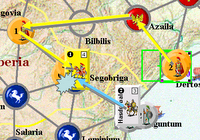 The repercussions of the loss sends shockwaves through Thevestis and Corduba, but Carthage quickly moves to quell any uprising, re-establishing control over those areas. Scipio, meanwhile, consolidates his gains, placing PCs in Saltimanca, Segovia, and Segobriga. Scipio sends details of his plans for the next phase of operations to Rome, but the Messenger is Intercepted.
The repercussions of the loss sends shockwaves through Thevestis and Corduba, but Carthage quickly moves to quell any uprising, re-establishing control over those areas. Scipio, meanwhile, consolidates his gains, placing PCs in Saltimanca, Segovia, and Segobriga. Scipio sends details of his plans for the next phase of operations to Rome, but the Messenger is Intercepted.Marcellus, long vacationing with his army in Mutina, finally moves back to Western Rome, placing his army in the port of Cosa, to await further instructions.
Carthage continues to shore up it's political situation, placing PCs in Zuccabar and Vescera in Western Numidia.
Rome then launches a Major Campaign.
- Scipio takes his army to Segovia (pick up 1CU), Toletum, Solaria (drop 1CU), and ends in Laminium.
- Longus takes 3CU from Rome and Sail to Carales in Corsica/Sardinia.
- Marcellus takes 10CU and sails to Icosium (Western Numidia), then moves overland to Saldae, in an attempt to attack Hanno.
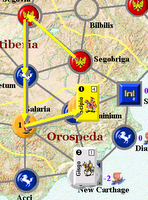 Hanno attempts to avoid battle, but Marcellus is able to force him into a fight. This battle is a short and relatively bloodless affair, which Rome wins (1CU v 2CU losses).
Hanno attempts to avoid battle, but Marcellus is able to force him into a fight. This battle is a short and relatively bloodless affair, which Rome wins (1CU v 2CU losses).At this point, Carthage sues for peace.
Conclusion
The defeat and loss of Hannibal certainly turned this game around quickly. Prior to that I felt like I was doing OK keeping Italy close, while waiting for Scipio, but was always just a small disaster away from a big problem. Once Hannibal was off the board, Rome had plenty of time and space to rectify the political situation in Italy, then move the fight to Africa once Scipio showed up.






